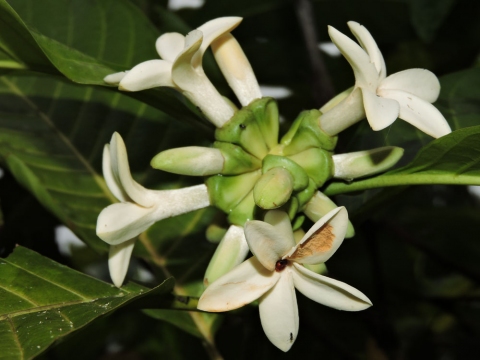Borojoa patinoi
Cuatrec.
Rubiaceae
Common Name: Borojo
General Information
Borojoa patinoi is a large, evergreen shrub or small tree growing 3 - 17 metres tall[
].
The fruit is much prized in parts of S. America, where it is often harvested from the wild and sold for high prices in local markets[
301- Title
- Cornucopia II
- Publication
-
- Author
- Facciola. S.
- Publisher
- Kampong Publications, California.
- Year
- 1998
- ISBN
- 0-9628087-2-5
- Description
- The second edition of an excellent guide to the edible uses of plants, though it does not give any details of cultivation etc.
]. The plant is sometimes cultivated by the indigenous people to make juice from the fruits and for medicinal purposes[
]. The plant has recently come to the attention of people outside the rainforest, and the fruit is currently (2010) being sold through a number of Internet sites as a health-promoting drink[
K- Title
- Plants for a Future
- Author
- Ken Fern
- Description
- Notes from observations, tasting etc at Plants For A Future and on field trips.
].
Known Hazards
None known
Botanical References
Range
Northwestern S. America - Colombia and Brazil, north through Central America to Nicaragua.
Habitat
Lowland rainforests, usually at elevations up to 700 metres but occasionally to 1,200 metres[
]..
Properties
| Edibility Rating |      |
| Medicinal Rating |      |
| Habit | Evergreen Tree |
| Height | 8.00 m |
| Cultivation Status | Cultivated, Wild |
Cultivation Details
A plant of warm tropical lowlands usually at elevations up to 700 metres, but sometimes to 1,200 metres[
]. It grows best in areas where annual daytime temperatures fall within the range 20 - 28°c, though it can tolerate 15 - 32°c[
]. Temperatures in its native region may reach up to an absolute maximum of 41°c[
]. It prefers a mean annual rainfall in the range 3,000 - 6,000mm, tolerating 2,500 - 9,000mm[
]. It thrives with high air humidity average up to almost 90%[
].
Succeeds in heavy soils[
335- Title
- Perennial Edible Fruits of the Tropics : an Inventory
- Publication
-
- Author
- Martin, F. W.; Campbell, C. W.; Rubertbe, R. M.
- Publisher
- U.S. Dept. of Agriculture, Agricultural Research Service
- Year
- 1987
- ISBN
-
- Description
- A booklet giving terse details of almost 300 species of edible fruits, plus regional lists of Botanical and Common names for over 2,500 less well-known edible fruits of the tropics.
]. Prefers a pH in the range 4.5 - 6.5, tolerating 4 - 7[
].
The fruit takes more than one year to ripen after flowering.
A dioecious species, both male and female forms need to be grown if fruit and seed are required[
].
Edible Uses
Fruit - eaten raw or made into jellies, preserves, sauces, ice cream etc[
301- Title
- Cornucopia II
- Publication
-
- Author
- Facciola. S.
- Publisher
- Kampong Publications, California.
- Year
- 1998
- ISBN
- 0-9628087-2-5
- Description
- The second edition of an excellent guide to the edible uses of plants, though it does not give any details of cultivation etc.
]. A sweet, aromatic flavour with some bitterness[
335- Title
- Perennial Edible Fruits of the Tropics : an Inventory
- Publication
-
- Author
- Martin, F. W.; Campbell, C. W.; Rubertbe, R. M.
- Publisher
- U.S. Dept. of Agriculture, Agricultural Research Service
- Year
- 1987
- ISBN
-
- Description
- A booklet giving terse details of almost 300 species of edible fruits, plus regional lists of Botanical and Common names for over 2,500 less well-known edible fruits of the tropics.
]. The green to brown fruit is 7 - 12 cm in diameter with a brown pulp that is very acid and dense[
].
The fruit pulp is used to prepare juice (jugo del amor), compotes, marmalades, candies and wine[
].
Medicinal
The fruit is prized for its tonic and cure-all qualities[
]. It is famous in western Colombia for its supposed aphrodisiac properties[
].
Other Uses
None known
Propagation
Seed -
If you have any useful information about this plant, please leave a comment. Comments have to be approved before they are shown here.









 Useful Tropical Plants Database 2014 by
Ken Fern,
web interface by
Ajna Fern
with help from
Richard Morris.
Useful Tropical Plants Database 2014 by
Ken Fern,
web interface by
Ajna Fern
with help from
Richard Morris.